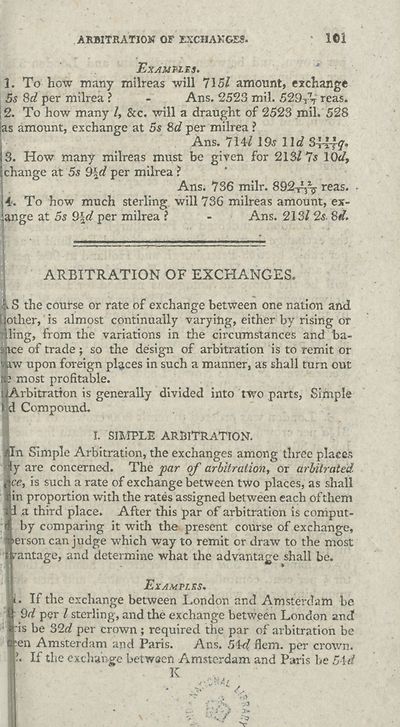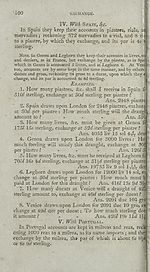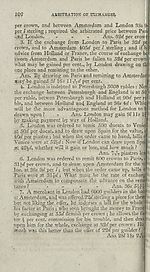Download files
Complete book:
Individual page:
Thumbnail gallery: Grid view | List view

ARBITRATION OF EXCHANGES.
iei
Examples.
1. To how many milreas will 715/ amount, exchange
5s 8d per milrea ? - Ans. 2523 mil. 529Tt rea.s.
2. To how many /, &c. will a draught of 2523 mil. 528
as amount, exchange at 5s 8c? per milrea ?
Ans. 714? 19s lid 344x7*
3. How many milreas must be given for 213? 7s lOd,
change at 5s 9|c? per milrea ?
Ans. 736 milr. 8924jV teas.
4. To how much sterling will 736 milreas amount, ex-
ange at 5s 9|rf per milrea ? - Ans. 213? 2s. 8«?.
ARBITRATION OF EXCHANGES.
S the coufse or rate of exchange between one nation and
Dther, is almpst continually varying, either by rising or
.ling, from the variations in the circumstances and ba¬
te of trade ; so the design of arbitration is to remit or
iw upon foreign places in such a manner, as shall turn out
most profitable.
'.rbitratton is generally divided into two parts, Simple
Compound.
I. SIMPLE ARBITRATION.
In Simple Arbitration, the exchanges among three places
y are concerned. The par of arbitration, or arbitrated
ce, is such a rate of exchange between two places, as shall
in proportion with the rates assigned between each ofthem
1 a third place. After this par of arbitration is comput-
by comparing it with the present course of exchange,
erson can judge which way to remit or draw to the most
vantage, and determine what the advantage shall be.
Examples.
. If the exchange between London and Amsterdam be
Qd per ? sterling, and the exchange between London and
is be 32d per crown; required the par of arbitration be
:en Amsterdam and Paris. Ans. 54<? flem. per crown.
If the exchange between Amsterdam and Paris be 54<?
K
iei
Examples.
1. To how many milreas will 715/ amount, exchange
5s 8d per milrea ? - Ans. 2523 mil. 529Tt rea.s.
2. To how many /, &c. will a draught of 2523 mil. 528
as amount, exchange at 5s 8c? per milrea ?
Ans. 714? 19s lid 344x7*
3. How many milreas must be given for 213? 7s lOd,
change at 5s 9|c? per milrea ?
Ans. 736 milr. 8924jV teas.
4. To how much sterling will 736 milreas amount, ex-
ange at 5s 9|rf per milrea ? - Ans. 213? 2s. 8«?.
ARBITRATION OF EXCHANGES.
S the coufse or rate of exchange between one nation and
Dther, is almpst continually varying, either by rising or
.ling, from the variations in the circumstances and ba¬
te of trade ; so the design of arbitration is to remit or
iw upon foreign places in such a manner, as shall turn out
most profitable.
'.rbitratton is generally divided into two parts, Simple
Compound.
I. SIMPLE ARBITRATION.
In Simple Arbitration, the exchanges among three places
y are concerned. The par of arbitration, or arbitrated
ce, is such a rate of exchange between two places, as shall
in proportion with the rates assigned between each ofthem
1 a third place. After this par of arbitration is comput-
by comparing it with the present course of exchange,
erson can judge which way to remit or draw to the most
vantage, and determine what the advantage shall be.
Examples.
. If the exchange between London and Amsterdam be
Qd per ? sterling, and the exchange between London and
is be 32d per crown; required the par of arbitration be
:en Amsterdam and Paris. Ans. 54<? flem. per crown.
If the exchange between Amsterdam and Paris be 54<?
K
Set display mode to:
![]() Universal Viewer |
Universal Viewer | ![]() Mirador |
Large image | Transcription
Mirador |
Large image | Transcription
| Antiquarian books of Scotland > Education > Complete treatise on practical arithmetic and book-keeping > (115) |
|---|
| Permanent URL | https://digital.nls.uk/114434950 |
|---|
| Description | Thousands of printed books from the Antiquarian Books of Scotland collection which dates from 1641 to the 1980s. The collection consists of 14,800 books which were published in Scotland or have a Scottish connection, e.g. through the author, printer or owner. Subjects covered include sport, education, diseases, adventure, occupations, Jacobites, politics and religion. Among the 29 languages represented are English, Gaelic, Italian, French, Russian and Swedish. |
|---|

